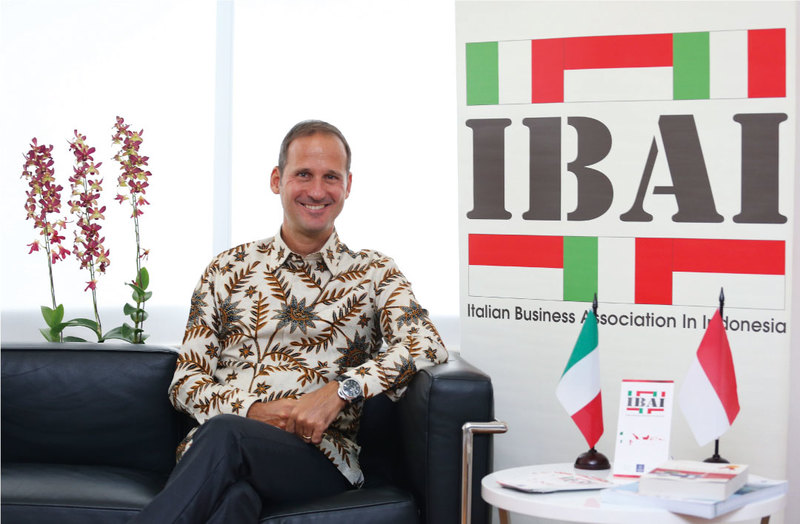
NOW! Jakarta sat down with Marco Noto la Diega, Chairman of Italian Business Association in Indonesia.
IBAI is still in its relatively early stages of development. Do you see positive results for your members? Are you happy with the progress in IBAI?
Yes, IBAI is getting stronger, and I am pleased with the progress to date. Our members base is growing and getting stronger in terms of corporate presence from diversified sectors and sizes, from multinationals to small-medium enterprises, and in terms of Indonesian companies’ representation as well.
We are also becoming more digitally present, with revamped website for easier interaction, and with a regular newsletter to strengthen our community and share communication in real time.
We are pleased to have expanded our service offerings to two strategic modules, Market Entry Studies and Partner Search & Matching, which have already proven successful in some projects.
Lastly, in recognition on our progress, I am pleased that IBAI in now formally enrolled since 1 year into EIBN (EU-Indonesia Business Network), a consortium of five European Chambers of Commerce in Indonesia (Italy, UK, Denmark, France, Germany and Europe), under the European Commission program, aimed at enhancing and diversifying trade and European business investment in Indonesia, while promoting the country as a gateway to ASEAN. We feel honoured to have joined and be able to contribute.
What do you see as the main objectives of IBAI?
As our members base grows and becomes diversified, we are enabled to pursue our main objective: act as the convergence platform for the Italian and Indonesian business communities in Indonesia, with the aim of sharing the knowledge about business opportunities available in Indonesia and initiating possible cooperation between the two countries.
To implement the above, we regularly share with our members the latest updated information on regulations, business forums, and foreign investments. Likewise, we arrange thematic business gatherings in various formats to socialize and review specific matters of relevance.
Essentially, we promote information sharing, while building social occasion for business exchanges, networking, and knowledge refinement.
Is there strong interest by Italian companies to invest in Indonesia? What sectors?
The record of investment realisation in Indonesia since 2013 is relatively small (~328 million USD) and quite below other EU countries (in 7th position). It does reveal presence in rubber and plastic industry, trade & repair, mining, hospitality, food& beverage, and some textile.
Looking ahead, there is clearly ample margin for growth. We in IBAI therefore maintain an optimistic view regarding the prospect of Italian businesses in Indonesia, as we firmly believe that Indonesia is a priority partner, in itself and within the whole APAC region.
It is important to recognize that our Italian companies have a role to play in respect to the top five sectors selected by the Indonesia Government in “Making Indonesia 4.0”: food & beverages, textile & apparel, automotive, electronics and chemicals. To socialise and promote such awareness with our members, IBAI is partnering with various organizations to provide privileged access to IBAI members to attend thematic conferences of relevance, such as the upcoming Annual Hotelier Summit Asia in Sept in Jakarta.
Now that the elections are over, IBAI’s wish is for an intensified activity for the rest of 2019, assisted by the EU-Indonesia CEPA agreement in preparation, to positively close the year 2019. This is important for us as the year 2019 marks the 70th anniversary of Italy & Indonesia diplomatic relations.
Is IBAI dealing directly with the Indonesian government on some issues, or are the dialogues now channelled through Eurocham? How does this work?
Both channels are applicable and possible. The main mission of Eurocham being to act as an advocacy group, IBAI sometimes converges into the Eurocham channel to lobby for global matters. We are also in the Working Groups of Eurocham.
Other times, as for any other bi-lateral chamber, IBAI acts directly, notably to address specific requests. For example, we have been providing input to the Ministry of Manpower on draft updated regulation of Job List Position for Foreign Workers.
We also deal directly with the Indonesian Government when its representatives are speakers at our IBAI events. For example, I am pleased to recall here the Conducive Investment Climate, a Policy Review meeting we recently held in July, with the attendance of the Coordinating Ministry for Political, Legal and Security Affairs, BKPM and Directorate of Immigration from Ministry of Law & Human Rights. It was an important moment of exchange and clarification, after the uncertainty we all experienced during the election period.
What do you see as the business areas facing challenge in the upcoming year and which do you see as highly potential?
About the business areas facing challenges, keeping in mind that IBAI view is non-political but purely business-driven, allow me to refer to the recent public debate for the possible tariff for dairy products from EU and to the earlier similar difficulties for European spirit imports to Indonesia in the beginning of the year. These are two immediate examples of business areas exposed to substantial difficulties arising from a broken equilibrium, where a relatively high natural market demand is conflicting with external regulatory instability originating from political “tit-for-tat” temptations. We believe that this usually ends in jeopardizing potential and destroying value.
About the high potential business areas, there are different drivers which makes me think of various sectors: the “Industry 4.0” Indonesia road-map points to Infrastructure and Manufacturing, notably if export-oriented and import-substitute; the new “10 Bali” Government’s plan indicates high potential in the Tourism area, notably if eco-sustainable; the rapid growth of Indonesia e-commerce industry and the millennial leisure lifestyle preference indicates growth potential in the Creative industry; lastly, the huge country need to sustain the ambitious growth plan calls for a big emphasis on the Education sector.
Do you see any major changes to the business arena as a result on the recent elections? Positive or negative aspects?
I believe that the recent elections outcome can bring a positive change to the business arena, regardless of the political result, simply because the “uncertainty” associated to that long election period is now mostly over. After a period of stand-by, the country is now in principle enabled to activate again the way towards simplified bureaucracy, clearer regulatory frameworks, and open-up reforms.
We IBAI recognize that Indonesia has initiated the reform journey, even if sometimes at slow pace, and believe it must now continue with more sustained rhythm to fully fulfill the country’s promised potential. My hope and my expectation as chair of IBAI are therefore that Indonesia does expedite moving in the direction of furtuer improving the ease of doing business here, as reflected in the index progress.
For this aim, we in IBAI wish to stress the important of maintaining a balanced approach to business, built on open-policy and possibly immunity from the looming threat of political trade-retaliation. We also count on a solid orchestration of the post-election cabinet reshuffle, in order to firmly continue in the direction of development and reform path.
Overall, despite some current hick-ups, we keep an optimistic view for the country and the business landscape, maintaining however the due pragmatism about the country’s challenges and intrinsic complexity. We therefore believe that moving forward is possible, with due patience and respect for this beautiful country I am—personally and as IBAI Chairman—loyally dedicated and committed to.






